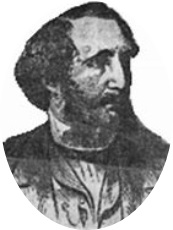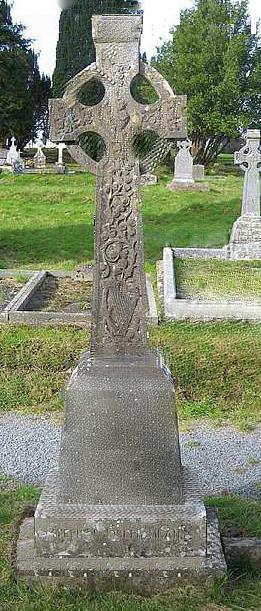|
Stephen Joseph Meany (1822-1888)
Young Ireland Rising of 1848 participant, "A Felon of our
Land", Writer and Publisher,
Political exile, Clan na Gael member and Land League activist.
 Stephen Joseph Meany was born in Newhall, Co. Clare, Ireland on September 12, 1822 into a poor tenant family. His primary education was in the public schools of Ennis. Being a determined and talented student he managed to gain acceptance to a classical school in Ennis to further his education. During his student years he wrote poems for the Clare Journal. In 1841 his poetry book entitled 'Shreds of Fancy' was published. At the age of eighteen, Meany married a young woman from Athenry by whom he had two sons and two daughters Stephen Joseph Meany was born in Newhall, Co. Clare, Ireland on September 12, 1822 into a poor tenant family. His primary education was in the public schools of Ennis. Being a determined and talented student he managed to gain acceptance to a classical school in Ennis to further his education. During his student years he wrote poems for the Clare Journal. In 1841 his poetry book entitled 'Shreds of Fancy' was published. At the age of eighteen, Meany married a young woman from Athenry by whom he had two sons and two daughters
He worked as a junior reporter at the Clare Journal newspaper before joining the Dublin Metropolitan police force. Policing was not his forte and after a year or so he left the force to pursue a carrier in journalism. He worked for the Freeman's Journal, a nationalist newspaper where he achieved the position of chief reporter.
Apart from being a fluent Irish speaker and an excellent journalist; his short-hand skills were unsurpassed and well known to the newsmakers of the time. His reputation was such that Daniel O'Connell asked that Meany report on all of his speeches. In 1843 when he reported on a speech by O'Connell in Irish he was the only journalist present who understood the language. His close relationship with O'Connell was evident when he was chosen to accompany him in his carriage on his release from Richmond prison in 1844.
As with many of O'Connell's followers, Meany came to the realization that constitutional politics was getting nowhere and that force was the only language England understood. He concluded that if Ireland was to achieve any measure of freedom it would be through the use of force.
During this time period he continued to work as a journalist with the
Irish Felon and the Irish Tribune. In 1845 he joined the Young Ireland movement and took part in the Young Ireland Uprising of 1848. He was captured with other leaders and imprisoned under the provisions of the Habeas Corpus Suspension Act.
Following his release in 1849 he went to Liverpool where he founded the first Catholic regional newspaper the
Lancashire Free Press. He also became the first President of the English Press Association. In 1860 he emigrated to the United States where he worked as a journalist for the
New York Herald, Sunday Times and Harper's Weekly. He joined the Fenian movement and was one of the "Senators" in O'Mahony's organization. He was also involved in organizing fundraising events for the relief of those arrested in the Fenian raids on Canada.
He lived in Toledo, Ohio for a number of years where he became part owner and editor of the
Toledo Daily Commercial and German Weekly. He was also the editor the
Toledo Times.
On a visit to Ireland in November, 1867 Meany was arrested for speeches made in the United States, tried for treason and sentenced to penal servitude for fifteen years. Below is an excerpt from Meany's speech from the dock:
"Taking other ground, my lords, I object to any sentence upon me. I stand at this bar a declared citizen of the United States of America, entitled to the protection of such citizenship'; and I protest against the right to pass any sentence in any British court for acts done or words spoken, or alleged to be done or spoken on American soil, within the shades of the American flag and under the sanction of American institutions. I protest against the assumption that would in this country limit the right of thought or control the liberty of speech in an assemblage of American citizens in an American city. The United States will, doubtless, respect and protect her neutrality' laws and observe the comity of nations, whatever they may mean in practice—but I protest again against the monstrous fiction the transparent fraud that would seek in ninety years after the evacuation of New York by the British to bring the people of New York within the vision and venue of a British jury that in ninety years after the last British bayonet had glistened in an American sunlight, after the last keel of the last of the English fleet ploughed its last furrow in the Hudson or tho Delaware after ninety years of republican independence would seek to restore that City of New York and its institutions to the dominion of the Crown and Government of Great Britain. This is the meaning of it, and disguise it as you may., So will it be interpreted beyond the Atlantic. Not that the people of America care one jot whether S. J. Meany were hanged, drawn, and quartered to-morrow, but that there is a great principle involved. Personally, I am of no consequence : politically, I represent in this court the adopted citizen of America for, as the New York Herald, referring to this case observed, if the acts done in my regard are justifiable, there is nothing to prevent the extension of the same justice to any other adopted citizen of the States visiting Great Britain. It is, therefore, in the injustice of tho case the influence lies and not in the importance of the individual".
Meany was released in 1868 as a result of U. S. government intervention. On his return to the United States he made several trips to the mid-west organizing meetings and fund-raising for the Fenian movement. He became active in the American Land League and Clan na Gael, the successor to the Fenian organization. He also resumed work as a journalist for the
World Star and Weekly Democrat. He was admitted to the American Bar Association and became an American citizen.
Despite the likely possibility of being arrested because of his past record and Fenian association he, nonetheless, visited Ireland on numerous occasions during the next decade delivering lectures on nationalist issues. In 1869 he visited Ennis and received an enthusiastic welcome at a reception in his honor. In 1882, he was arrested in Ennis under Forster's Coercion Act, but was soon released. In 1885 he went to London to help in the defense of Burton and Cunningham, who were implicated in the attempt to destroy the Tower of London. He was in Ennis in 1886 for the unveiling of the Manchester martyrs memorial.
He died in February 1888 in Waterbury, Connecticut. His body was brought to Ennis for burial in Drumcliffe graveyard on March 11, 1888. Thousands of people turned out as the coffin was shouldered from the Cathedral to the cemetery. An impressive Celtic cross marks his grave.
His published works include a volume of poems entitled
'Shreds of Fancy' republished in America under the title of 'Shells from the Shannon' a series of
'Tracts' and a story of Irish persecution entitled 'The Terry Alt; a Story of 1831'.
Contributed by;
Tomás Ó Coısdealbha
cemetery
AND
grave
location
Name:
Drumcliffe
Graveyard
ADDRESS: Ennis,
Co.
Clare,
Ireland
Grave
No. 309
HEADSTONE

click on headstone to view
inscription |